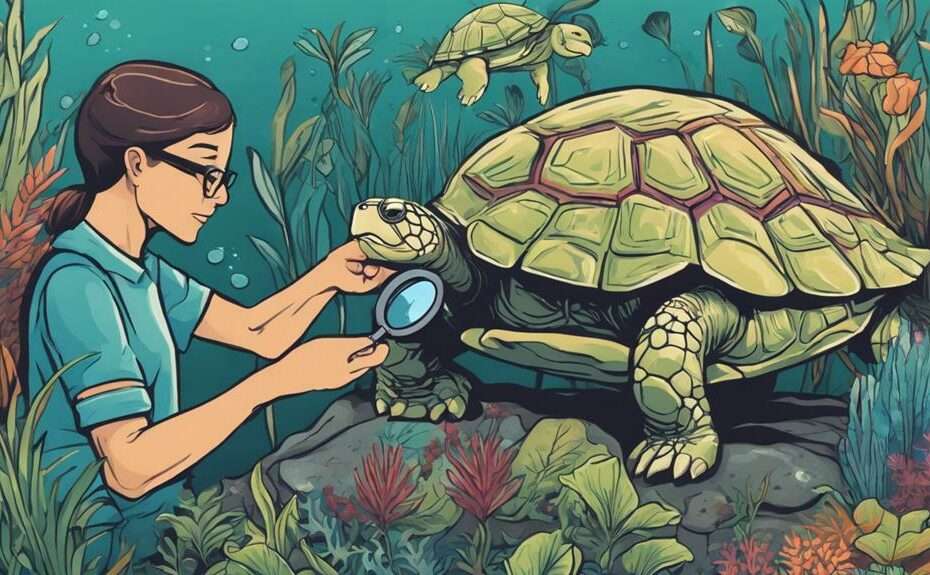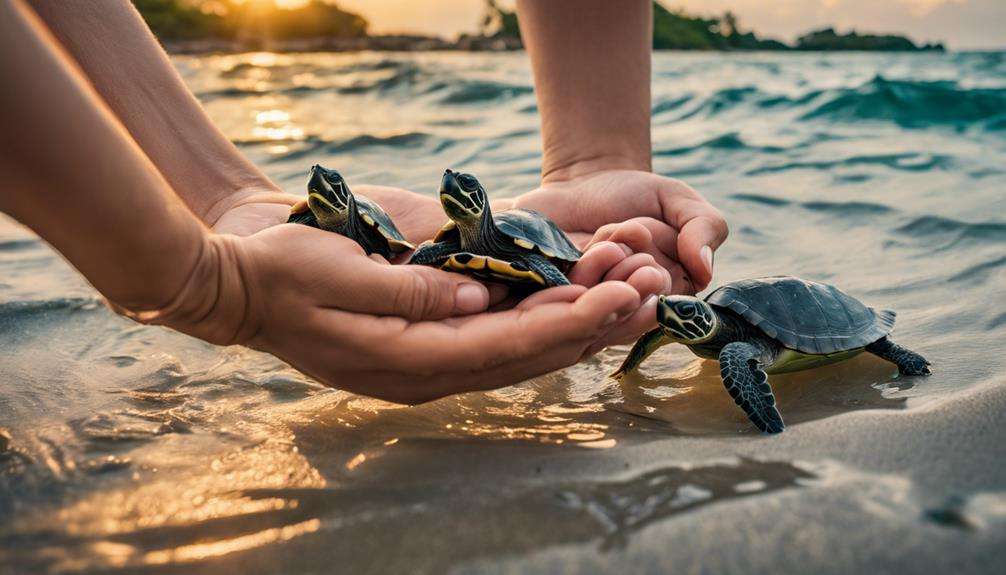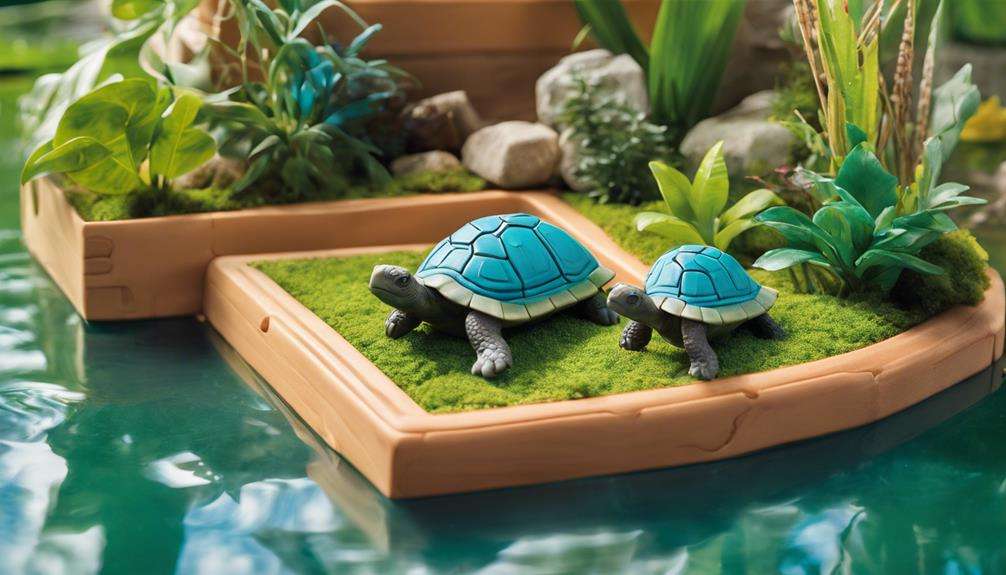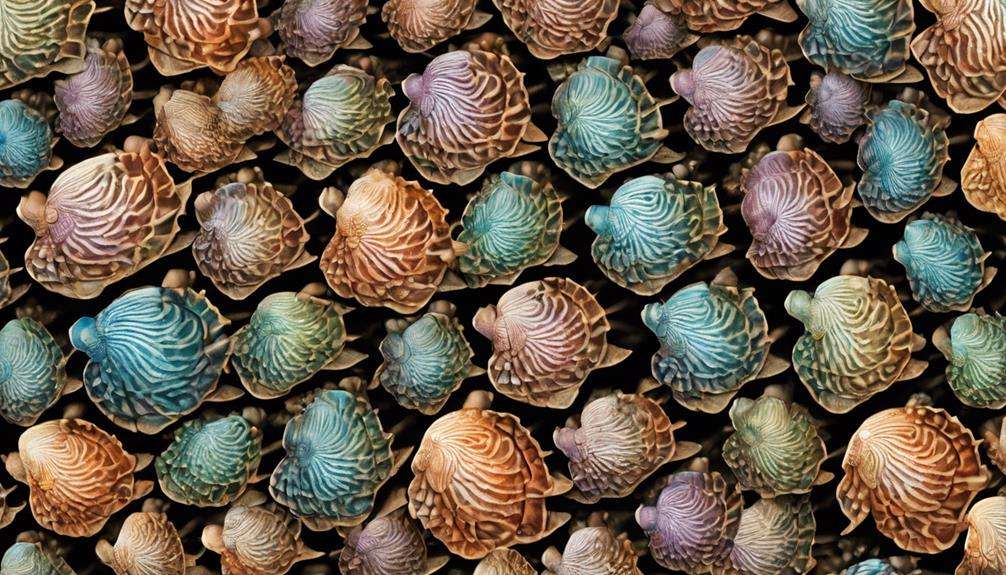When starting on the journey of acquiring special turtle species, you'll find that making the right choices is essential. From understanding the intricacies of different turtle types to ensuring their well-being, there are various factors to navigate.
However, before you take the next step in this fascinating world of unique reptiles, there's one aspect you shouldn't overlook— a decision that could make or break your special turtle experience.
Key Takeaways
- Research care needs, habitat, and diet before buying.
- Choose ethical sellers with health guarantees.
- Provide suitable environments for specific species.
- Budget for high initial and ongoing costs.
Types of Special Turtle Species
Special Turtle Species come in a variety of unique and fascinating types, each with distinctive characteristics that set them apart in the world of reptiles. Among these special turtle species are the Indian Star Tortoise, known for its striking star-shaped patterns adorning its shell, making it a visually enchanting species. The Diamondback Terrapin, found in brackish waters along the eastern United States coast, is unique in its habitat preference and is a species of particular interest to many turtle enthusiasts.
Bog Turtles, one of the smallest and rarest turtle species in North America, face numerous threats such as habitat loss and poaching, making them a species in need of conservation efforts. On the other hand, the Roti Island Snake-necked Turtles, native to Indonesia, boast distinctive long necks and unique feeding habits, adding to their allure.
Each of these special turtle species, including the Vietnamese Box Turtle sought after in the illegal pet trade, contributes to the diverse tapestry of the turtle and tortoise world, making them fascinating subjects for study and conservation.
Factors to Consider Before Buying
Before purchasing a special turtle species, it's important to thoroughly consider the specific care requirements, habitat preferences, and dietary needs of the species you're interested in. Different special turtle species have varying needs when it comes to temperature, humidity levels, lighting, and diet. Researching these aspects beforehand will help you provide the best possible care for your new pet. Additionally, it's important to research the availability of captive-bred specimens to make certain that your turtle is ethically sourced and to support conservation efforts.
Evaluate the space and resources you have available to meet the unique needs of special turtle species before making a purchase. These turtles require adequate space to swim, bask, and hide, as well as appropriate filtration systems for their aquatic habitats. Consider the long-term commitment required for caring for special turtle species, as they can live for several decades. Consulting with experienced reptile keepers, breeders, or veterinarians can provide valuable insights and guidance on selecting and properly caring for special turtle species.
Finding Reputable Sellers

When seeking out special turtle species, your journey to a trusted source starts with finding reputable sellers who prioritize the well-being and care of their turtles. Reputable sellers are often professional breeders who offer detailed information about the turtle's origin, health history, and specific care requirements. It's crucial to choose sellers who provide guarantees for the health and authenticity of the turtle species you're interested in purchasing. To avoid any unpleasant experiences, steer clear of sellers with a track record of unethical practices or negative reviews.
To make a smooth transaction and ensure the well-being of your future pet, seek recommendations from experienced turtle enthusiasts, browse online forums, and reach out to reputable reptile organizations. These sources can point you in the direction of trustworthy sellers who uphold high standards when it comes to caring for and selling special turtle species. By doing your homework and choosing wisely, you can set yourself up for a positive buying experience and a healthy turtle companion.
Caring for Special Turtle Species
To properly care for special turtle species, make sure you meet their specific habitat requirements, including providing both water and land areas in their enclosure. Maintaining adequate water quality is vital for the health of aquatic turtle species such as the Diamondback Terrapin. Make certain the water is clean, free of chlorine and ammonia, and at the appropriate temperature.
Special turtle species like the Painted Turtle have unique dietary needs, requiring a varied diet of insects, fish, and aquatic plants to thrive. When caring for turtles with intricate shell patterns like the Wood Turtle, provide a suitable environment that allows them to exhibit their natural behaviors.
Conservation efforts are essential for critically endangered species like the Radiated Tortoise. Supporting organizations dedicated to protecting these turtles and their habitats is crucial for their survival. Special turtle species with distinct physical characteristics, such as the Pancake Tortoise, need environments that cater to their specific needs, like spaces where they can wedge into crevices for protection.
Budgeting for Rare Turtle Purchases

Budget wisely when considering the purchase of rare turtle species. Take into account not only the initial cost but also the ongoing expenses for their proper care and maintenance. Rare turtle purchases can be a significant investment, with costs often reaching several thousand dollars per turtle. It's important to budget for more than just the purchase price; ongoing expenses such as specialized habitat requirements, premium food options, and potential veterinary care should all be factored in.
To budget effectively, research the specific care requirements of the rare turtle species you're interested in. Understanding their needs will help you anticipate and plan for the associated costs. When buying a rare turtle, make sure the seller provides guarantees for the health and authenticity of the species. This can protect your investment and give you peace of mind.
Frequently Asked Questions
What Is the Best Type of Turtle to Buy?
When picking the best type of turtle to buy, consider turtle care, habitat, diet, behavior, lifespan, health, and enrichment. Research the specific needs of the species to assure proper care. Consult with experienced owners for advice.
What Is the Most Affectionate Turtle Breed?
For the most affectionate turtle breed, consider the Red-Eared Slider. These loving turtles enjoy bonding with you, respond well to training, and can recognize you. Create a turtle-friendly environment to nurture your special bond.
What Is the Best Turtle for a First Time Owner?
For a first-time owner, the Three-Toed Box Turtle is ideal. Their hardiness, omnivorous diet, docile nature, availability, and adaptability make them a great choice. With proper care, they thrive, offering a rewarding pet experience.
What Is the Most Expensive Turtle Species?
Rare turtles like the Radiated Tortoise boast unique colors, making them in high demand as exotic pets. Their price range can reach $50,000. Breeding programs and conservation efforts are essential to safeguard these species.
Conclusion
Guarantee your special turtle species selection is secure, sustainable, and satisfying. Remember to research, review, and reflect before making a rare reptile purchase.
Seek sellers with stellar reputations for superior specimens. Carefully cultivate a cozy habitat, provide proper nutrition, and handle with heedful hands.
Budget wisely to bolster the well-being of your treasured turtle companion. Stay steadfast in your commitment to the care and conservation of these charming creatures.






